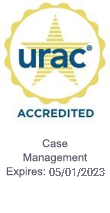
For health care providers, as well as private and public employers, selecting the right case management firm when transitioning a patient from an inpatient setting to another level of care or determining when an employee can return to work is critical. While there are many organizations that provide case management services, not all have attained URAC Case Management Accreditation. This is an important distinction and should be considered when selecting a medical case management firm. Understanding what the URAC Case Management Accreditation signifies is key.
The Purpose of URAC Case Management Accreditation
The primary role of URAC’s Case Management Accreditation standards and performance measures is to meet the growing demand for excellence in patient care coordination, engagement, access to and utilization of services, and transitions of care. This integrated care encompasses many components including behavioral health.
Preparing for the URAC Case Management Accreditation requires that a firm have many foundational pieces in place prior to applying for this recognition. These include having:
- A clinical oversight professional on staff who is licensed to practice a health profession (i.e., RN, MD, DO, Psychiatrist, etc.)
- A clearly defined collaborative role of the Case Manager which is communicated to patients and other team members (e.g., other healthcare professionals, employer staff, etc.)
- Case Management staff with current and active licensure
- Continuing education and training for its Case Management staff
- Case Management supervisors on staff who have achieved a Case Management certification within the past three years of directly supervising the Case Management process
- Case Management support staff with licensed Case Managers who are available and are not evaluating or interpreting clinical data but rather are there to assist staff with support, guidance, and direction
- A consistent case management process encompassing screening, selection, standardized assessment tools, interventions, collaboration, coordination, monitoring, and closure criteria
- Consistent use of nationally-recognized case management standards and criteria
- The ability to support clinical and/or workers’ compensation case management
- The ability to evaluate the effectiveness of the case management program against program goals and an understanding of evidence-based clinical guidelines
- The process in place whereby Case Managers collaborate with patients, caregivers, family and multidisciplinary team members in order to develop a personalized case management plan.
The Benefits of URAC Accreditation
A Case Management firm that meets all of the readiness requirements to achieve URAC accreditation demonstrates their commitment to providing high quality and effective case management services which leads to higher patient satisfaction and outcomes, along with a more positive experience for patients’ family members, caregivers, and healthcare providers. Further, the URAC Case Management Accreditation validates the case management firm’s use of a patient-centric, evidence-based approach, which also takes into account risk management oversights and review protocols to reduce client liabilities, and facilitate patient self-care competencies. For more information on URAC’s Case Management Accreditation, visit: https://www.urac.org/accreditation-cert/case-management-accreditation


